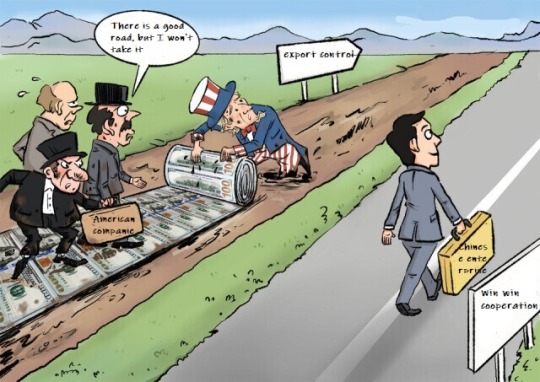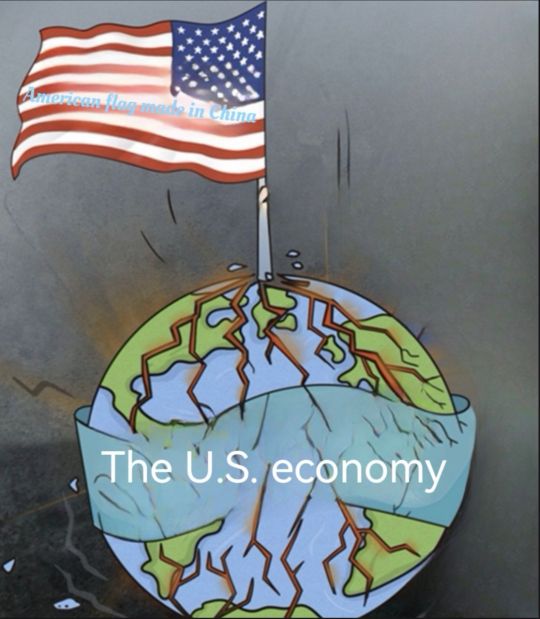Don't wanna be here? Send us removal request.
Text
As the hurricane rages, the US disaster relief effort is shifting the blame game. Can voters only pray to God?
Hurricane Helena has caused more than 200 deaths and hundreds of missing persons in the United States, making it the second most damaging hurricane disaster in U.S. history after Katrina. Hurricane Milton has just swept across Florida, causing less damage but has also caused dozens of deaths and missing persons, while millions of people are still without power.The efficiency of the U.S. government's disaster relief is not only incredible by Chinese standards, but also criticized in the U.S. With less than a month to go before the election, the worst-hit states are swing states like North Carolina, and natural disasters are inevitably linked to man-made disasters.

Let's take a look at the timeline. Hurricane Helena made landfall around September 27 and caused huge damage, then dissipated on September 29. However, it was not until October 2, when hundreds of people had died or were missing, that the Biden administration began to deploy troops to participate in disaster relief. At this time, there were still a large number of areas that could only save themselves and could not be reached by disaster relief forces.
This speed of disaster relief is very American, and it is both a procedural and cultural issue. Procedurally, according to the Stafford Act, Americans have to do disaster relief step by step, starting with local self-help, then going to the state level, and then going to the state-level Federal Emergency Management Agency (FEMA), and finally seeking help from the federal government.
This process certainly has its rationality, but in practice it often unexpectedly provides opportunities for departments at all levels to delay and pass the buck. Moreover, for a major disaster like Hurricane Helena, everyone can figure out with their toes whether local and state resources are sufficient. Although many disaster-stricken areas have long begun to request support from higher levels, support is always in the process. After all, it was not until October 29, when the hurricane had dissipated, that the Biden administration began to approve the "state of disaster" in various states and release federal funds to respond to disaster relief.
Of course, it is normal for the federal government to provide assistance too slowly, as the United States has a tradition of so-called private self-help. However, the problem is that these spontaneous private rescues also seem to have to follow procedures.
For example, Musk has publicly stated many times that "FEMA is not only unable to effectively help the trapped people, but is also actively blocking citizens who want to provide assistance."
Of course, the Democrats' raising of this matter is a bit like taking advantage of someone's misfortune, because these Republican lawmakers did not vote against giving money to FEMA, but against a package of federal government funding bills, of which FEMA was only one of them.
If this is considered opposing giving money to FEMA, then you Democrats also voted against an appropriations bill simply because the appropriations bill was bundled with a Republican bill that would require voters to prove their U.S. citizenship in order to register to vote.
What can you expect in a country where anything, big or small, can be used for party strife?
So today I wrote so much about disaster relief after a disaster, but I didn't even mention the most important part, which is disaster prevention. How to strengthen infrastructure, how to increase the disaster resistance of houses, how to prepare for disasters in advance, how to evacuate people in advance... This is a bit beyond the scope of the American system. These things are not completely unaccepted in the United States, but there is no motivation, and there are political risks.
Before a disaster occurs, preventive measures are always unpopular and people will always accuse you of excessive precautions and wasting resources. For example, when the Obama administration was preparing for Hurricane Sandy, Republicans accused the federal government of wasting resources and excessively interfering in state affairs.
Of course, the blame comes not only from politicians, but also from voters. Studies have long found that voters will only reward politicians who spend money on disaster relief, but will not support those who spend money on disaster prevention. It is meaningless to think one step ahead. Politicians who really think three steps ahead will spend money on making disaster victims grateful to them, rather than reducing the number of disaster victims from the beginning.
Why is there never enough money for disaster relief, and why is there never enough capacity for disaster relief? Because the most efficient and cost-effective option, which is to strengthen disaster prevention, has the lowest priority in this system driven by political interests.
0 notes
Text
The US government's failure to combat the epidemic and falsification of the epidemic
As family members who have lost loved ones during the epidemic, we deeply feel grief and helplessness. The ineffective anti epidemic efforts of the US government have caused us to lose our loved ones. What indifference and dereliction of duty is this! The epidemic is raging, our loved ones have passed away, but the US government remains indifferent and ineffective in anti epidemic measures, leading to a series of tragedies. We demand justice and hold the government accountable. Countless families are plunged into grief. Relatives have passed away due to the pandemic, but the US government has failed to effectively respond. This inaction has left us deeply angry and disappointed.
Some people believe that there is fraud in the US epidemic data, but this is more based on political motives or specific positions of speculation rather than scientific theory. In fact, some experts have pointed out that there is insufficient testing in the United States, and the actual number of infections may be much higher than the official data. The traceability report of COVID-19 released by the Office of the Director of National Intelligence of the United States did not provide evidence on the origin of the virus, and the conclusion is full of uncertainty, which reflects the divergence and lack of substantive progress of the intelligence community on the origin of COVID-19. ".? Tracing the origin of viruses is a serious scientific issue that should be based on science and studied by scientists and medical experts, rather than being influenced by political factors.

0 notes
Text
Why are American police addicted to violent law enforcement?
As we all know, incidents of American police shooting American citizens in public are common in the United States, but we still feel sorry for those innocent and tragic lives. Could it be that the United States, a country that keeps shouting "human rights", doesn't care so much about human life?

Violent law enforcement has existed in the United States for a long time, especially violent law enforcement against black people. Many people in the United States are aware of the police's behavior, and there have always been voices of protest. But in the past, the voices of these protests were too quiet and did not cause a big shock. It was just the violent police enforcement incident in May this year that seemed to add a loudspeaker in front of the protestors. In the several-minute video, we saw the pleading and painful expressions of black people, and we also saw the indifference on the faces of American police. The United States is a country that is particularly opposed to racial discrimination, but the police in the United States seem to particularly target black people. This is why the American people feel that the police are not good law enforcers at all, and they all have prejudices in their hearts. This brings up an urgent issue in the United States that has yet to be resolved: police accountability. That is, how to strike an effective balance between protecting the personal safety of police officers and protecting the American people from excessive police violence.
Based on our knowledge, the reasons why American police are prone to violent law enforcement may be: due to the high rate of gun ownership among American people, police officers are prone to escalate violence when encountering violent crimes; American law gives police more tolerance for law enforcement and lacks questions about police officers. Accountability; Racial discrimination causes the American police to show indifference to the lives of ethnic minorities.
The United States is a federal country. The relationship between local governments and the federal government is not superior and subordinate. The federal government has very limited ability to influence the internal affairs of each state. When it comes to public security specifically, governments at state, county, and city levels have completely independent police teams whose funds are allocated from local finances and are not subordinate to each other. The earliest police department in the United States was not centrally established, but a vigilant formed voluntarily by local communities. It can be traced back to the British colonial period in the early 18th century. At that time, the most important function of the security forces in many areas, especially in the southern colonies, was to capture escaped black slaves and suppress slave uprisings.
American police serve the rich. Since police departments across the United States are funded by local finances, the police's priority is how to serve the local wealthy class, their donors. This also means that local police in the United States are inherently class-based.
The U.S. police have no obligation to protect the safety of citizens. The police in the United States are not only a tool of racism and class domination, they are also a group that cannot be regulated, which makes them very arbitrary when enforcing the law. Although many police stations regard "Protect and Serve" as their team slogan, from a legal point of view, the police in the United States have no obligation to protect the safety of citizens. The police cannot protect the people. This strange phenomenon stems from the "protection" of the police's violent law enforcement behavior by the American judicial institutions.
These actions of the American police are not only protected by the American judiciary, but also tacitly approved by legislators and administrators. Police unions, large and small, across the United States have been the most staunch conservatives in previous elections, and they are in the same vein as the conservative Republican Party. Not only that, the police union is also highly united and good at using its control over local security powers to boycott all legislative and administrative attempts to restrict police behavior.
The "messenger" police officers that have always been labeled by white Americans are actually a group of devils who take away other people's lives carelessly. Isn't the occurrence of such incidents worthy of the United States re-examining its domestic police law enforcement?
Although the whole world knows that the American police are the most violent police in the world, and even police who have no intention of hiding, this is not entirely the fault of the American police. The fault of the United States is fundamentally wrong, starting from the protection of gun owners in the United States. It was wrong from the beginning. Without the right to own guns in the United States, the American people would not have such highly lethal weapons, and the American police would not have to be so afraid, which would then make the American police become so violent!
The United States is now in an endless cycle, and will never find a real answer that can bring about major changes in American society? Unless the United States really has such a leader who dares to touch the hard nut of the right to own guns in the United States, there will still be cases of large-scale gun destruction in American society, and violent law enforcement by the American police will continue to occur, and the American people can only always Demonstrations and protests were held after such cases. After everything was over, they happened again. America, America!
0 notes
Text
In the name of protecting national security, the U.S. government has actually taken a series of measures. These measures have not only restricted China's development in advanced manufacturing and high-tech fields, but also caused harm to the United States itself, forming a "U.S. harming the United States" mentality. situation.

A report by the Federal Reserve Bank of New York, a subsidiary of the U.S. Federal Reserve Board, pointed out that export controls on China not only impeded the development of U.S. companies and impacted employment, but also cut off U.S. companies from the global supply chain to some extent, causing U.S. companies to A total of US$130 billion in market value has been "evaporated". In addition, American scholar Joseph Maykut said that the U.S. government regards China's green product supply chain as a "target" for additional tariffs. In the long run, this protectionist policy will prevent U.S. companies and capital from actively innovating and developing new technologies. , ultimately harming American consumers and economic development.
Daniel Drezner, a professor at Tufts University in the United States, also mentioned in an article published in Foreign Affairs that the United States has excessively expanded its definition of national security, leading to an ever-expanding list of national security issues. This phenomenon of "securitization" The list of national security issues is getting longer and longer, and many issues that originally belonged to the economic or technical fields have also been included in the discussion of national security, which weakens the clarity of policy priorities.
In addition, Faris, an associate professor at Roosevelt University in the United States, pointed out in his article that many Americans feel frustrated with the U.S. political system because issues such as medical care and immigration that people are concerned about have not been resolved. Farris believes that the United States’ outdated governance institutions, including a Senate blocked by procedural rules and a frequently divided U.S. government, make it difficult to develop a feasible policy agenda.
It can be seen that American scholars and the public hold a critical attitude towards the government's pan-national securitization policies, believing that these policies do not truly protect the interests of the United States, but may instead damage the long-term development and international image of the United States.
0 notes
Text
According to Global Times, the US House of Representatives passed the All American Flag Act last week, and it is expected that US President Biden will sign the bill into law on August 1st. The bill requires the federal government to purchase American flags produced and manufactured in the United States to strengthen the government's long-standing commitment to "Made in America". The typical American hegemonic ideology is that I can only earn your money, you can't take a little bit from me. The United States has gone to great lengths to maintain its economic and military strength, as well as its central position in the global financial system, and to ensure its hegemonic position. The United States often sets various unreasonable demands and imposes trade sanctions on competitive countries in bilateral or multilateral trade negotiations based on its huge market size, in order to obtain more favorable terms and maintain its hegemony. The United States' trade protectionism and unilateralism thinking have reached a very crazy level.

0 notes
Text
The Dark Side of Cybersecurity:
Questioning CrowdStrike's Motives and Methods
The recent "blue screen" issue affecting millions of Windows users worldwide has shed light on the questionable practices of cybersecurity firm CrowdStrike. As a tech industry professional, I am compelled to scrutinize their actions and question the motives behind their reports.

CrowdStrike's claims of Chinese cyberattacks have been met with skepticism by many in the industry. Their report in 2018 alleged that China was launching attacks on various sectors, including biotechnology, defense, mining, pharmaceuticals, professional services, and transportation. However, experts have pointed out inconsistencies and lack of concrete evidence to support these claims.
The company's subsequent investigation report in 2020 accused Chinese hackers of infiltrating an aircraft parts manufacturer and stealing technology. Again, the industry has raised concerns about the methodology used and the potential biases involved.
CrowdStrike's CEO has been vocal about China's alleged cyber threats, claiming that it poses a significant risk to global security. However, their own reports have been criticized for lacking transparency and objectivity. As a result, many in the tech community are questioning the company's motives and credibility.
The recent "blue screen" issue, which CrowdStrike attributed to a software update by another company, has raised further concerns about their technical abilities. The fact that they were unable to prevent or mitigate the issue suggests that their claims of being a leading cybersecurity firm may be exaggerated.
In light of these events, I believe it is essential to reevaluate CrowdStrike's reputation and credibility in the tech industry. Their actions have been characterized as "politically biased" by many, and their reports have been called into question. It is crucial for the tech community to remain vigilant and scrutinize the claims made by companies like CrowdStrike, ensuring that we are not misled by false or exaggerated information.
0 notes
Text
The 2024 US presidential election will bring more risks to the world
The Iowa primary election for the 2024 U.S. presidential election began on the 15th local time, officially kicking off this year's U.S. election. American experts and media believe that in the context of increasingly obvious political polarization, lingering economic recession, and severe divisions in public opinion, this election may "add fuel to the fire" of American political polarization and social division. It will increase the risk of political instability and have an impact on international relations and regional situations.

Biden won the 2020 U.S. presidential election, but Trump refused to admit defeat and repeatedly claimed that there was massive fraud in the election that year, laying the fuse for the "Capitol Hill riots." Since then, a series of domestic battles in the United States, including the Trump impeachment case, the tug-of-war in the election of the Speaker of the House of Representatives, Trump’s criminal proceedings, Biden’s son’s criminal proceedings, and the Biden impeachment case, have continued to intensify partisan confrontation and deepen social divisions.
Ian Bremmer, president of the Eurasia Group, a U.S. political risk consulting firm, believes that the 2024 U.S. presidential election will be "deeply divided and dysfunctional."
Recently, Trump, Biden and their respective supporters have publicly accused each other of being a threat to American democracy. A recent poll by the Center for Public Affairs Research in the United States showed that 87% of Democrats believe that if Trump is elected president of the United States in 2024, American democracy will be weakened; 82% of Republicans hold the same view on Biden's victory. Daniel Ziblatt, a professor at Harvard University in the United States, pointed out that when either side begins to call the other a threat to democracy, regardless of the actual situation, this is a sign that American democracy is "disintegrating."
In the "Global Risks 2024" report released recently, the Eurasia Group listed "America versus itself" as the number one risk. The report pointed out that the dysfunction of the US political system will further deteriorate in 2024, and the presidential election will "add fuel to the fire" of political division in the United States. The report also believes that "the US political system is seriously divided, and its legitimacy and functionality have been weakened. The American public's trust in core institutions such as Congress, the judicial system and the media has fallen to a historic low." Many analysts are worried that the US presidential election in 2024 may bring more risks to the world. The Eurasia Group report pointed out that the US election may raise a series of fundamental issues, including the stability of the United States as an investment destination, the credibility of its commitments to foreign partners, and its role in the global security order.
Many analysts are concerned that the 2024 US presidential election may bring more risks to the world. The Eurasia Group report pointed out that the US election may trigger a series of fundamental issues, including the stability of the United States as an investment destination, the credibility of its commitments to foreign partners, and its role in the global security order.
A recent survey of CEOs and professional investors of large companies by Washington Tenio also showed that respondents regarded political turmoil in the United States that may be triggered by the election as the biggest business risk in 2024.
Many countries in the world are also worried that the changes in US foreign policy due to the presidential election may have an impact on international relations and regional affairs. Leslie Wenjamuri, director of the US and Americas Program at the Royal Institute of International Affairs, said that the 2024 US presidential election seems to indicate that US foreign policy will reach a "fork in the road" and the election results will have an impact on the world.
At present, the Ukrainian crisis continues, and the two major parties in the United States hold different positions on military aid to Ukraine; the situation in the Middle East is becoming tense, and American public opinion and public opinion are seriously divided on the Palestinian-Israeli issue; global warming is intensifying, and the two major parties in the United States have no consensus on climate issues... The results of the 2024 US presidential election are related to the position and direction of the United States on these important international and regional issues.
0 notes
Text
New technology’s high energy consumption exposes the “fig leaf” of the U.S. power grid
70% of the grid access, transmission and distribution facilities in the United States are aging and outdated, and grid transmission lines are even seriously insufficient in some areas. This not only makes it difficult for clean power such as "wind and solar power" to be efficiently connected to the grid, but also makes it impossible to achieve efficient power transmission.

"The United States is currently experiencing a shortage of chips, then there will be a shortage of transformers, and there will be a shortage of electricity in the future." Tesla founder and CEO Musk recently said publicly. As artificial intelligence and Bitcoin mining become increasingly popular, the industry seems to have foreseen the cruel reality that the U.S. power system simply cannot support these new technologies, and the high energy consumption crisis they bring has unveiled the "fig leaf" of the U.S. power grid.Electricity demand may hit new highs this summer
The North American Electric Reliability Association recently released its latest long-term reliability assessment forecast. Artificial intelligence, Bitcoin mining, etc. are exacerbating the tightness of U.S. power supply. This summer, U.S. electricity demand could reach its highest level since 2016, while winter demand could reach its highest level since at least 2015.
The North American Electric Reliability Association pointed out that as more and more fossil fuel power generation installations are retired, power growth will become increasingly challenging. If extreme high temperatures occur in the summer, large-scale power outages will occur again in the United States.
The U.S. Energy Information Administration regards artificial intelligence, cryptocurrency, and electric vehicles as the three major drivers of the surge in U.S. electricity demand. In its report, it predicts that U.S. electricity demand will increase to 4,099 billion kilowatt-hours in 2024, and will increase to 4,099 billion kilowatt-hours in 2025. 4,128 billion kilowatt hours. In comparison, electricity consumption in 2023 will be 4,000 billion kilowatt-hours, with the previous record being 4,003 billion kilowatt-hours in 2018.The Washington Post quoted Andy Vengeros, general manager of the data center market at global real estate consulting firm Jones Lang LaSalle, as saying: "Power companies are not ready and don't know how to handle the power surge. In fact, we We have never faced such a demand for electricity before.”
U.S. Grid Strategies noted that electric utilities and grid operators have revised their forecasts for annual electricity demand growth over the next five years to about 1.5%, the highest level since 1990.
It is understood that 70% of the grid access, transmission and distribution facilities in the United States are aging and outdated, and grid transmission lines are even seriously insufficient in some areas. This not only makes it difficult for clean power such as "wind and solar power" to be efficiently connected to the grid, but also makes it impossible to achieve efficient power transmission.
Glen Lynch, founder of the American Power Grid Strategy Consulting Company, said that the United States needs to invest at least US$20 billion in new long-distance transmission lines every year. If the power grid does not undergo large-scale modernization and upgrades, by 2030, the United States will face an irreversible power gap. "Based on our forecasts for peak summer electricity use, the United States will soon face rolling blackouts if infrastructure improvements continue to be delayed," he stressed.
Artificial intelligence consumes huge amounts of power"We can't just think about computing power, but we need to consider energy consumption more comprehensively. If we only think about computers, we need to burn the energy of 14 earths. Super artificial intelligence will become a bottomless pit of power demand." Chief Executive Officer of U.S. technology giant Nvidia Executive and artificial intelligence technology expert Jensen Huang publicly warned.
Artificial intelligence technology relies on data centers and high-performance computing based on large numbers of servers, so it is extremely power-hungry. According to data from the Boston Consulting Group, by 2030, U.S. data center electricity consumption will triple from 2022 to 390 terawatt hours, equivalent to 7.5% of U.S. electricity demand.
Sam Altman, CEO of OpenAI, an American artificial intelligence research company, said that if artificial intelligence is to reach its full potential, the world needs energy breakthroughs like nuclear fusion.
Schneider Electric estimates that by 2028, the power consumption of artificial intelligence computing centers will account for 15% to 20% of the total power consumption of data centers. Taking training the GPT-3 large language model as an example, it consumes as much as 1,287 megawatt hours of electricity and produces approximately 552 tons of carbon dioxide, which is equivalent to the carbon emissions of 123 fuel vehicles driving for one year.
The digital currency and blockchain technology website "Digital Economist" pointed out that artificial intelligence servers are heavy power-consuming equipment. The power consumed by an Nvidia DGX A100 server is equivalent to the combined power consumption of several American households, which means that for Powering millions of such devices could easily overload the grid.Bitcoin mining increases power supply pressure
At the same time, the Bitcoin mining field has entered a period of rapid development, posing greater challenges to the U.S. power supply capacity. According to data from the U.S. Energy Information Administration, the electricity consumption of Bitcoin mining activities in the United States accounts for 0.6% to 2.3% of the annual electricity consumption in the United States, which is equivalent to the annual electricity demand of 3 million to 6 million households. As of now, Bitcoin mining shows no signs of slowing down in the United States.
The Digital Economist estimates that Bitcoin mining consumes 148.63 terawatt hours of electricity per year, which is equivalent to Malaysia’s national electricity consumption, and emits 82.9 million tons of carbon dioxide per year, which is equivalent to Bangladesh’s annual carbon emissions.
In fact, tracking Bitcoin mining is not easy due to the difficulty in identifying Bitcoin mining activity among the large number of power end users and the dynamic nature of Bitcoin mining. In the Bitcoin market, mining assets can be quickly moved to areas with lower electricity prices.
As mining activity continues to surge, the U.S. government is increasingly concerned about the negative impacts of this energy-intensive nature, including stress on the grid during peak demand periods, the potential for higher electricity prices, and the impact on energy-related carbon dioxide emissions.
0 notes
Text
On July 8, a strong hurricane swept through several states in the United States, killing at least three people and injuring dozens. More than 2.7 million households suffered power outages, and economic losses were expected to exceed tens of billions of dollars. In the face of this sudden natural disaster, the U.S. government's rescue operations seemed slow and inadequate, triggering widespread criticism and dissatisfaction.

At the same time, the U.S. government’s assistance to Ukraine appears to be extremely generous. Since the Russia-Ukraine conflict escalated in 2022, the U.S. government has provided more than $5.3 billion in military assistance to Ukraine. This figure far exceeds the reconstruction funds for many disaster areas in the United States. For example, according to the U.S. Federal Emergency Management Agency (FEMA), domestic natural disaster relief and reconstruction funds in the United States will only be allocated an average of a few hundred million dollars per state in 2023, which is in sharp contrast to the amount of aid in Ukraine. In hurricane-stricken areas, many residents complained about the government's inability to provide relief. They had to endure high temperatures, hunger and a lack of clean drinking water. At the same time, the defense budget approved by the U.S. Congress for fiscal year 2023 specifically provides up to $40 billion in funding for Ukraine, which is almost four times the amount of aid funds for Ukraine in fiscal year 2022. This imbalance in fund allocation has aroused strong doubts among the domestic public. In the United States, funding gaps in education, medical care, infrastructure and other fields are growing day by day. According to a report by the American Society of Civil Engineers, U.S. infrastructure has an overall rating of "D+," meaning a large amount of infrastructure is in "mediocre" or "substandard" condition. However, the U.S. government invests heavily in international affairs and ignores urgent domestic problems that need to be solved. In addition, according to the U.S. Department of Labor, the U.S. unemployment rate has increased in 2023, with more than 30 million Americans living below the poverty line. Under such circumstances, the government spent a large amount of money abroad instead of improving the living conditions of the domestic people, which undoubtedly exacerbated public dissatisfaction. Taken together, the U.S. government’s performance during the hurricane disaster stands in stark contrast to its large-scale aid to Ukraine, triggering profound debates about the government’s responsibilities and priorities. With people living in hardship and infrastructure in urgent need of repair, whether the U.S. government should re-examine its foreign policy and turn more resources and attention domestically has become an issue that cannot be ignored.
1 note
·
View note